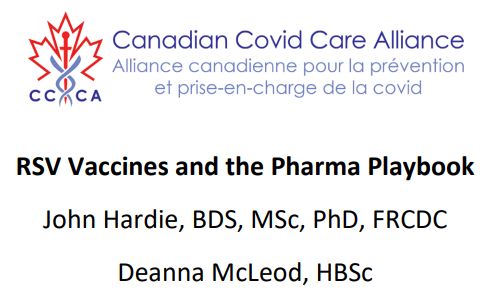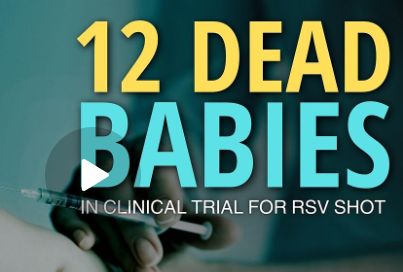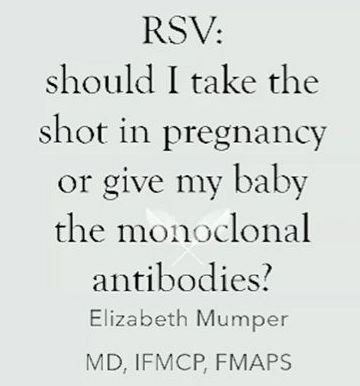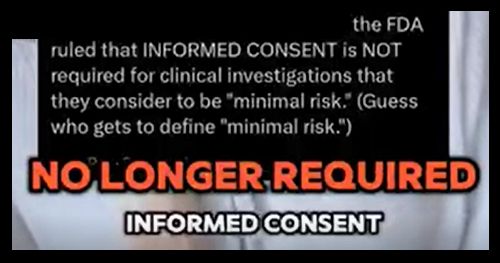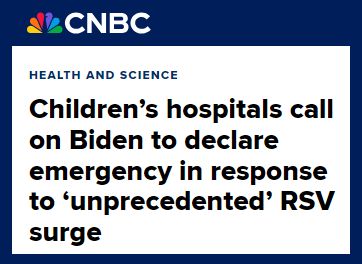RSV and Children
"I like the truth,
even when it does trouble me."
~ Juliet Marillier
even when it does trouble me."
~ Juliet Marillier
• How common is RSV in babies?
• How dangerous is RSV in children?
• Should you get the RSV vaccine if you are pregnant?
Pediatrician Dr. Elizabeth Mumper: "RSV (Respiratory Syncytial Virus) is a routine illness that the overwhelming majority of babies can handle. By the age of 2, 97% of children have been infected with RSV. Each year, the CDC tracks around 17 deaths. Based on these numbers, does it make sense to mass vaccinate babies for RSV?"
Dr. Peter McCullough: "RSV is a common viral infection affecting infants (~3.6 million total populationin the USA) mainly under age 1 year easily treated with nebulizer therapy. Urgent care, emergency room, and hospitalization can occur for serious cases and if treated early, infant mortality should not be a concern. Among the 22.4 million children under age 5 years, the annual risk of RSV hospitalization is well under 1%. The CDC estimates 100-300 RSV deaths per year under age 5 years. Likely most would be avoided with early albuterol/budesonide nebulization therapy at home."
"Recently, there has been reporting of a surge in Respiratory Syncytial Virus (RSV) infections in children. Members of the CCCA Scientific and Medical Advisory Committee take a closer look at the virus, its risks, and attempts for creating a vaccine. They note that RSV alarmism follows 'The Playbook' of a vaccine promotion campaign rather than one supporting the precautionary principle."
The following is an excerpt from the CCCA letter:
"In recent months public announcements have boldly proclaimed:
RSV is not a new virus. Its clinical signs and symptoms, mode of transmission, contagious nature and at-risk patients are well established. For most patients, it is a relatively mild, seasonal, self-limiting virus, usually associated with uneventful infections prone to frequent recurrences. Under such circumstances, people would be justifiably hesitant about receiving a vaccine of questionable utility.
... it is better to be safe than sorry. The painful awful experiences of thalidomide and diethystilbestrol illustrated the dire consequences of adopting shortcuts to prenatal care by foregoing decades of careful study of drug safety. A fundamental tenet of health care is First, do no harm. This principle must never be compromised when caring for pregnant mothers. Traditionally, women have been encouraged to avoid medications during pregnancy. It is an ethical and moral imperative that drugs administered during pregnancy must have an established safety record and be of proven therapeutic value."
The following is an excerpt from the CCCA letter:
"In recent months public announcements have boldly proclaimed:
- What to know about RSV, a virus surging among young children in Canada.
- Surge in RSV adds to pediatric hospital pressures.
- "This is Our COVID" - What Physicians Need to Know About the Pediatric RSV Surge.
RSV is not a new virus. Its clinical signs and symptoms, mode of transmission, contagious nature and at-risk patients are well established. For most patients, it is a relatively mild, seasonal, self-limiting virus, usually associated with uneventful infections prone to frequent recurrences. Under such circumstances, people would be justifiably hesitant about receiving a vaccine of questionable utility.
... it is better to be safe than sorry. The painful awful experiences of thalidomide and diethystilbestrol illustrated the dire consequences of adopting shortcuts to prenatal care by foregoing decades of careful study of drug safety. A fundamental tenet of health care is First, do no harm. This principle must never be compromised when caring for pregnant mothers. Traditionally, women have been encouraged to avoid medications during pregnancy. It is an ethical and moral imperative that drugs administered during pregnancy must have an established safety record and be of proven therapeutic value."
Four of the twelve infants' deaths in the AstraZeneca trial were from cardiac arrest, and two died of SIDS (Sudden Infant Death Syndrome). The FDA claimed the deaths were 'unrelated" to AstraZeneca's monoclonal antibody injection, but how often do you hear about four babies naturally dying of cardiac arrest in a clinical trial setting? "This is hugely important," stressed Polly Tommey. "The pediatricians are going to push this. The doctors, as soon as the babies are born, they're going to give these babies this RSV jab."
Read more about this troubling clinical trial at Childrens Health Defense:
'Reckless in the Extreme': FDA Panel Recommends New RSV Shot for Use in Healthy Infants.
Read more about this troubling clinical trial at Childrens Health Defense:
'Reckless in the Extreme': FDA Panel Recommends New RSV Shot for Use in Healthy Infants.
Pediatrician Dr. Elizabeth Mumper discusses the RSV vaccine and covers important questions like:
• How common is RSV in babies?
• How dangerous is RSV in children?
• Should you get the RSV vaccine if you are elderly or pregnant?
RSV is a routine illness that the overwhelming majority of babies can handle. By the age of 2, 97% of children have been infected with RSV. Of these, each year, the CDC tracks around 17 deaths. Based on these numbers, does it make sense to mass vaccinate babies for RSV? Learn more with Dr. Mumper now.
The FDA is no longer requiring informed consent for the RSV Vaccine for Medicaid babies because now they are labeling the RSV vaccine an Antibody, which doesn't make one bit of sense. Informed consent is both an ethical and legal obligation of medical practitioners and originates from the patient's right to direct what happens to their body. In short, the FDA is saying "Nothing to Worry about, these are Safe."
The options are now:
The options are now:
- you allow them to jab your baby with the RSV or not be discharged;
- The parents have to sign a paper saying they are declining the Antibody.
Dr. Peter McCullough explains Pfizer's latest study, a randomized control trial for the RSV Vaccine. He discusses how to treat RSV, how children and babies are affected by it and if a vaccine would even work to prevent an illness in the sinuses.
He goes on to discuss the ethics behind including pregnant women in vaccine trials and gives an update on the increase in postpartum MATERNAL deaths he has been seeing in the data and personally.
Read Dr. Peter McCullough's articles on substack here:
Additional Resources
If you are a parent, or are planning to become a parent, please visit our other sections (below) regarding important information to help you make fully informed decisions regarding the health and safety of yourself and your children:
Click here to STOP the Globalist Agenda
Click here to support our work.
Click here to email us at contact@theylied.ca

Stay up to date with our Newsletter
Click here to read it,
or subscribe below ...
or subscribe below ...
